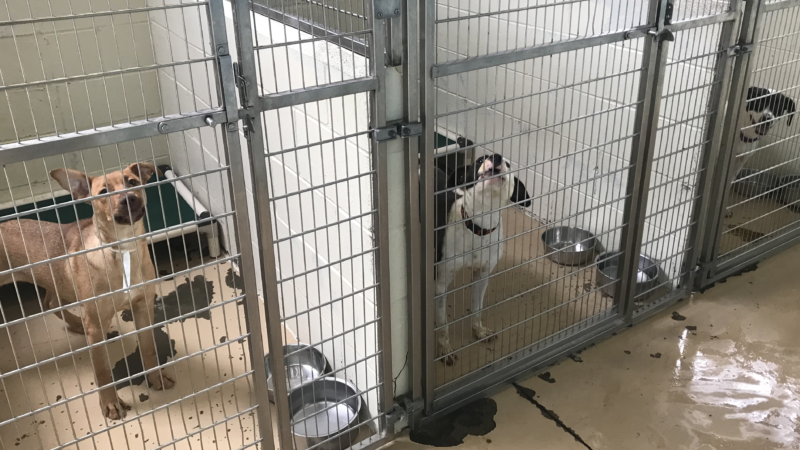Animal Shelters In The Gulf South Are Literally Overflowing With Animals
When Alie Dennis laid her eyes on Copper at the Metro Animal Shelter in Tuscaloosa, it was love at first sight.
Dennis, a University of Alabama student, came to the shelter in hopes of adopting a dog before her final year of school. After playing with the 3-month-old German shepherd Labrador mix for about an hour, she knew he was the one — asking for a 24-hour hold on the dog to talk the adoption over with her family.
But for Metro Animal Shelter, even 24 hours can be a long time if people are willing to take home a new pet. Last year, shelters in Louisiana, Alabama and Mississippi were running out of so-called “pandemic puppies.” Now, they are literally overflowing with dogs, cats, and even hamsters due to a variety of reasons — the lingering coronavirus pandemic, mating season, and transportation issues, to name a few.
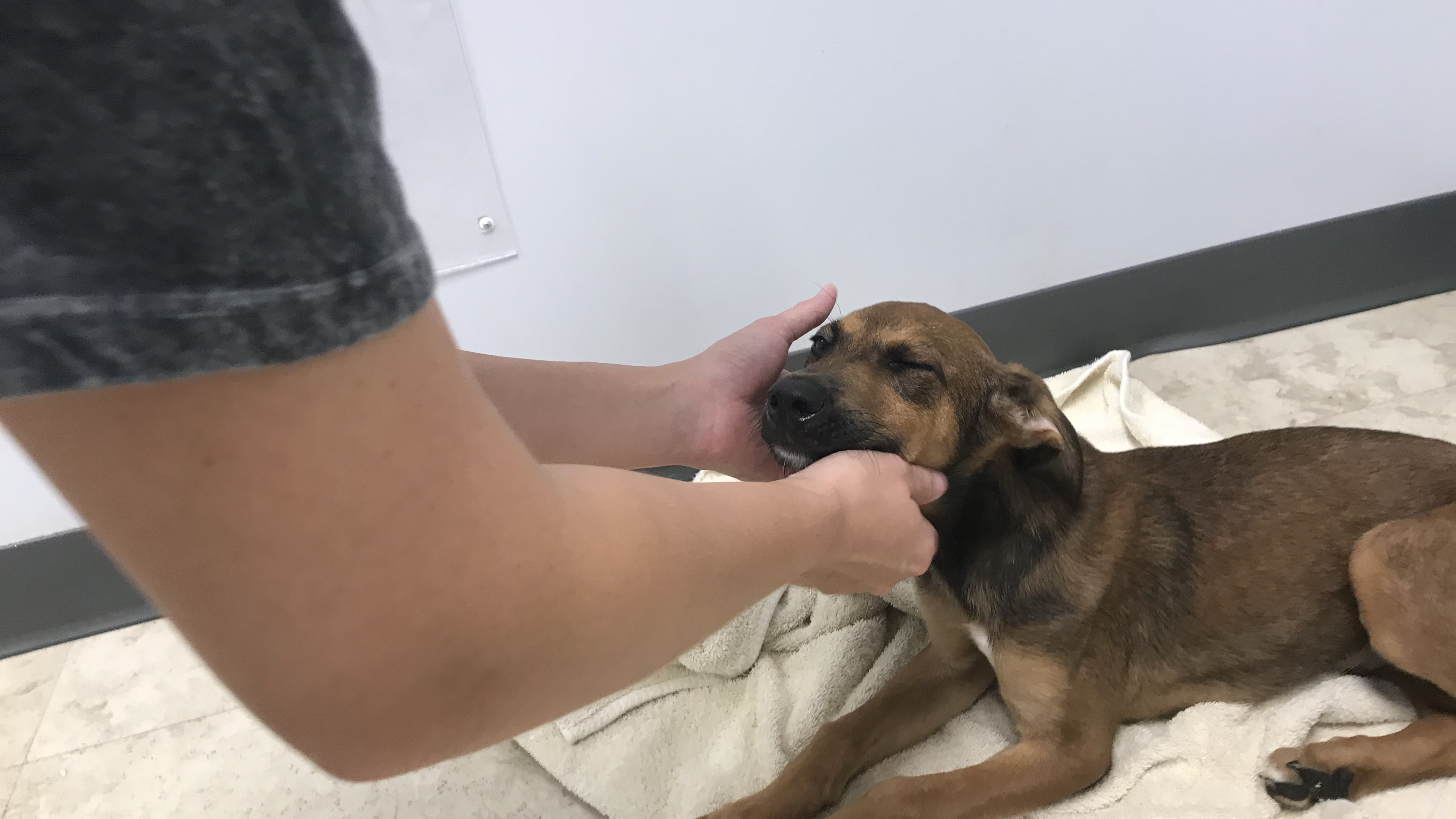
Eva Tesfaye,Gulf States Newsroom
Alie Dennis plays with her potential new puppy, Copper.
At the same time, Dennis was attempting to take Copper home, Ally Leerink, another area college student, was across the hall with her eyes on a puppy. Leerink, however, asked the shelter if she could keep the dog boarded for a few days if she were to adopt. Meghan Stavros, an adoption counselor at the shelter, said no.
“We need the cages,” Stavros told Leerink. “You guys don’t go in the garage area, but we have dogs literally in kennels right now because we don’t have enough space. So once they’re adopted we want them out if we can.”
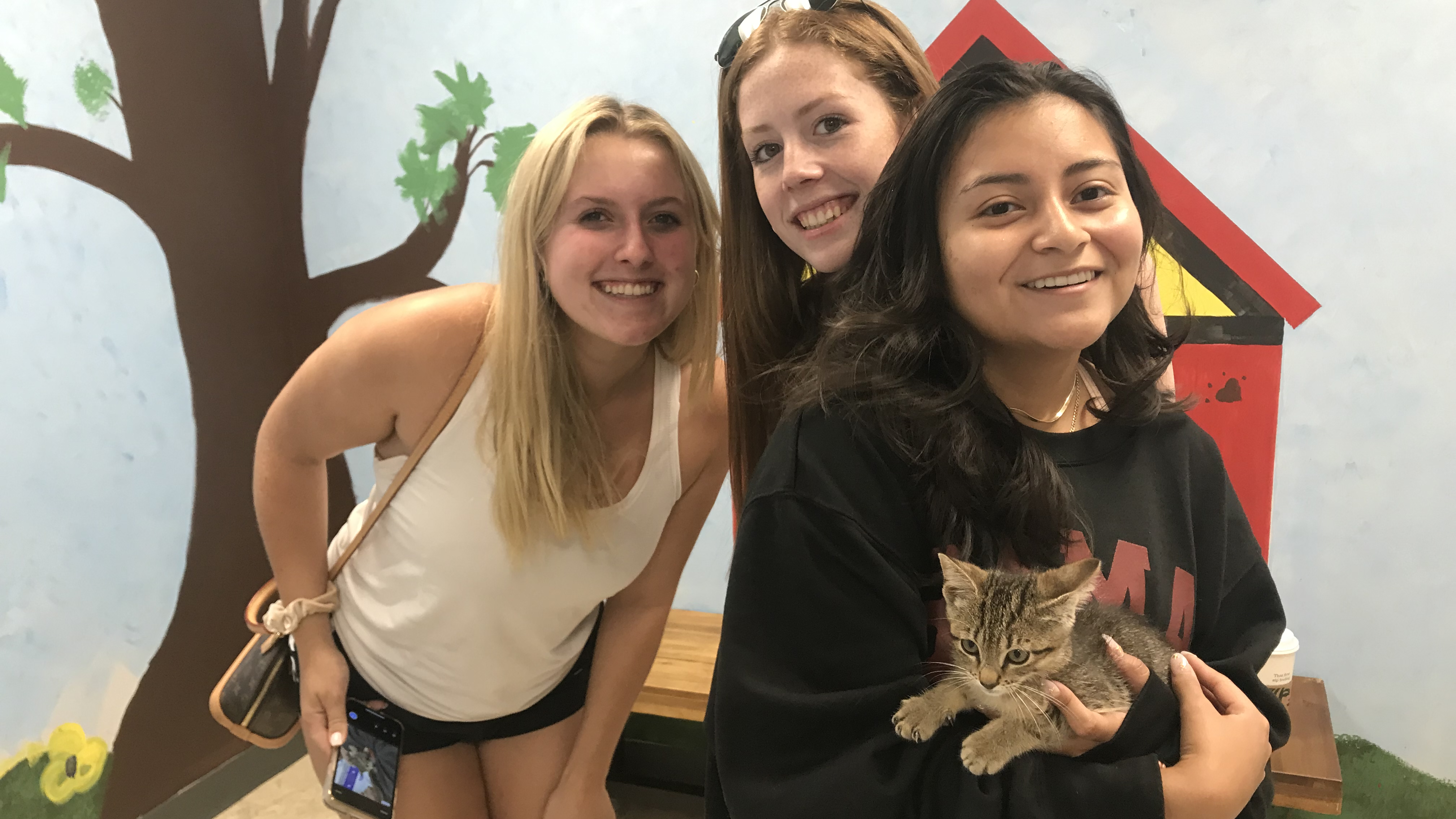
Eva Tesfaye,Gulf States Newsroom
Ally Leerink (left) considered getting herself a puppy after she and Amanda Oates (center) watched Beatrice Garcia (right) pick up a kitten.
More Animals Coming In, Less Leaving
Animal shelters in the Gulf South tend to have a lot of animals in general, partly due to the lack of access to veterinary care and spaying and neutering — especially in rural areas. High poverty levels also mean people cannot afford to take care of their pets, or their housing situations do not allow for any. It’s also not unusual for shelters to take in a lot of animals during the summer months because that’s when puppies and kittens are born.
The level of overcrowding at these shelters, however, rarely rises to the level it is at now. Data from 24PetWatch and analyzed by Best Friends Animal Society shows that shelter intake of animals has been higher this year than in 2020. While intake is still lower than it was in 2019, Best Friends found that more animals have entered the shelters than left them, which is leading to the high shelter population.
“It’s become like this superstorm where we have more animals coming, less animals leaving,” Makena Yarbrough, the senior regional director of programs at Best Friends, said.
Companion Animal Alliance in Baton Rouge has found that about half of their intake during the surge came from owners surrendering their pets due to moving challenges — often into lower-income housing or being evicted.
“We would assume that these are COVID-related,” said Emily Jackson, Companion Animal Alliance’s communications director. “We know that a lot of the lower-income housing environments do not accept pets that are larger in size, so we’re receiving a lot of pets over 25, 30, 50 pounds.”
After Hurricane Ida made landfall in southeast Louisiana in late August, the shelter also expected animals to come in from other shelters in the area that were affected by the storm as well as from local animal control services.
“As all of us in southeast Louisiana assess the storm damage, CAA is thankful that our region was spared the worst of it,” Jackson said. “In order to prepare for the possibility of an influx of pets from these neighboring shelters, we have arranged several transports to help decrease our population.”
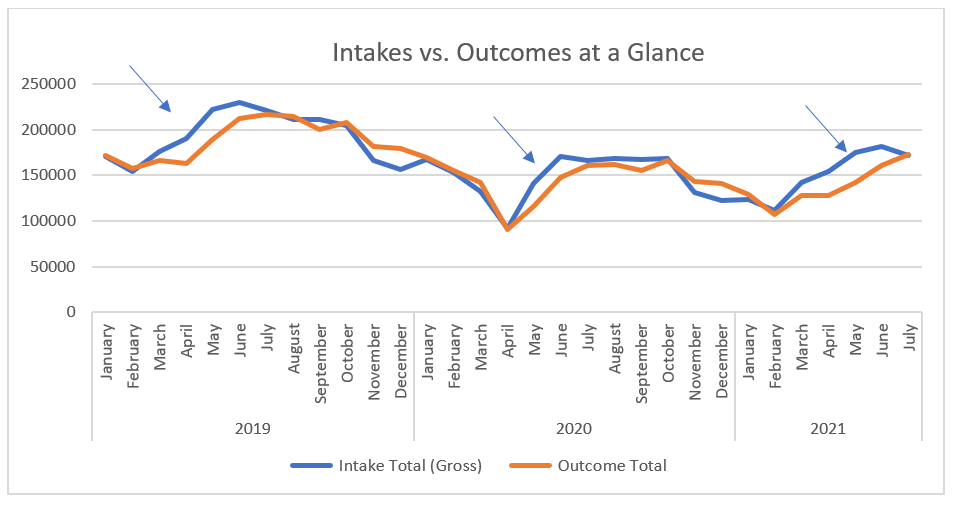
Best Friends Animal Society
Gaps in outcomes and intakes are typical during kitten season, but this year the gap is slightly wider, leading to a higher shelter population.
Transportation is also a problem. Shelters in Mississippi, Alabama and Louisiana usually transport many of their animals to other states, typically in the northern part of the U.S., that have a lower supply of animals. Much of that has slowed down due to those shelters also being full. Metro Animal Shelter’s next transport will only include about a third of the animals they usually send.
“Transport is a big lifeline for us and when that slows down, it hurts. It really does hurt,” said Thomas Sahm, the office and programs manager for the shelter.
The high rates of COVID and the spread of the delta variant are also leading to staffing issues, with Best Friends hearing reports of some shelters having to shut down completely because their entire staff has been exposed. Southern Pines Animal Shelter in Hattiesburg, Mississippi had temporarily stopped taking in animals at one point due to staffing shortages.
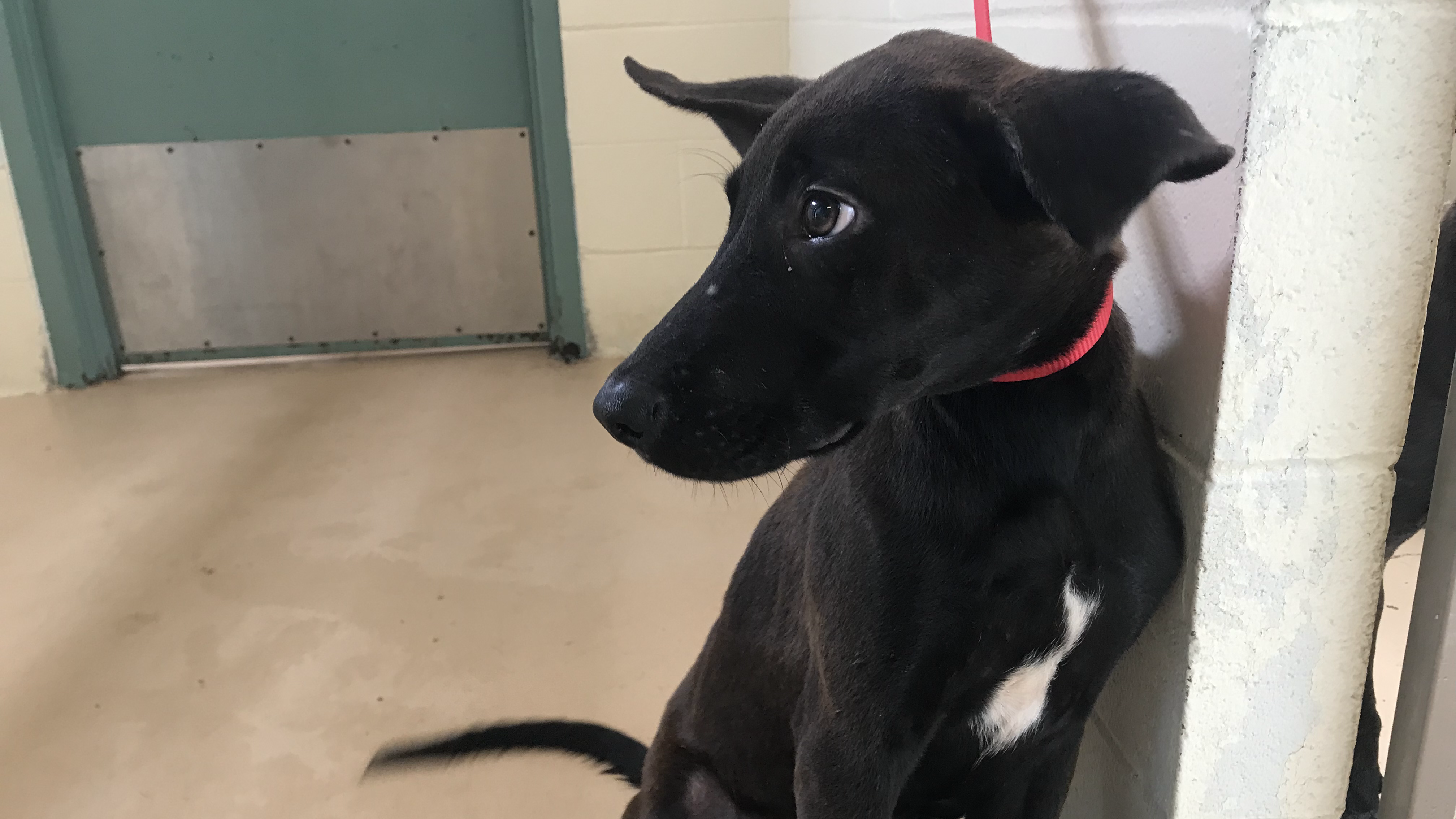
Eva Tesfaye,Gulf States Newsroom
Jeremiah, a picked-up stray at Metro Animal Shelter, waits for the staff and volunteers to clean up his cage.
How You Can Help
Shelters are encouraging people to help out in whatever ways they can. Aside from volunteering, fostering, and adoption, Yarbrough suggests that those who can no longer care for their pets should think about surrendering them to family or friends instead of a shelter. Many shelters also offer resources to assist owners so that they can keep their pets.
To encourage fostering, Companion Animal Alliance has “weekend fostering,” a program where people can foster animals just for the weekend to get them out of the shelter. The shelter is also making it easier to adopt by offering $15 adoption fees through September 19th. Another campaign back in July that completely waived adoption fees was somewhat successful.
“We had adopted 140 animals in just five days, but for reference, within those same exact five days, we took in 127,” Jackson said. “It’s like, ‘Wow, you all adopted nearly 150 animals!’ Meanwhile, what’s happening in the back is we’re also taking in nearly the exact same amount.”
Even so, the shelter is still grateful for any adoptions they can get.
Trump warns Iran not to retaliate after Ayatollah Ali Khamenei is killed
The Iranian government has announced 40 days of mourning. The country's supreme leader was killed following an attack launched by the U.S. and Israel on Saturday against Iran.
Iran fires missiles at Israel and Gulf states after U.S.-Israeli strike kills Khamenei
Iran fired missiles at targets in Israel and Gulf Arab states Sunday after vowing massive retaliation for the killing of Supreme Leader Ayatollah Ali Khamenei by the United States and Israel.
House Dem. Leader Jeffries responds to air strikes on Iran by U.S. and Israel
NPR's Emily Kwong speaks to House Minority Leader Hakeem Jeffries (D-NY), who is still calling for a vote on a war powers resolution following a wave of U.S.- and Israel-led airstrikes on Iran.
Iran’s Ayatollah Ali Khamenei is killed in Israeli strike, ending 36-year iron rule
Khamenei, the Islamic Republic's second supreme leader, has been killed. He had held power since 1989, guiding Iran through difficult times — and overseeing the violent suppression of dissent.
Found: The 19th century silent film that first captured a robot attack
A newly rediscovered 1897 short by famed French filmmaker Georges Méliès is being hailed as the first-ever depiction of a robot in cinema.
‘One year of failure.’ The Lancet slams RFK Jr.’s first year as health chief
In a scathing review, the top US medical journal's editorial board warned that the "destruction that Kennedy has wrought in 1 in office might take generations to repair."

